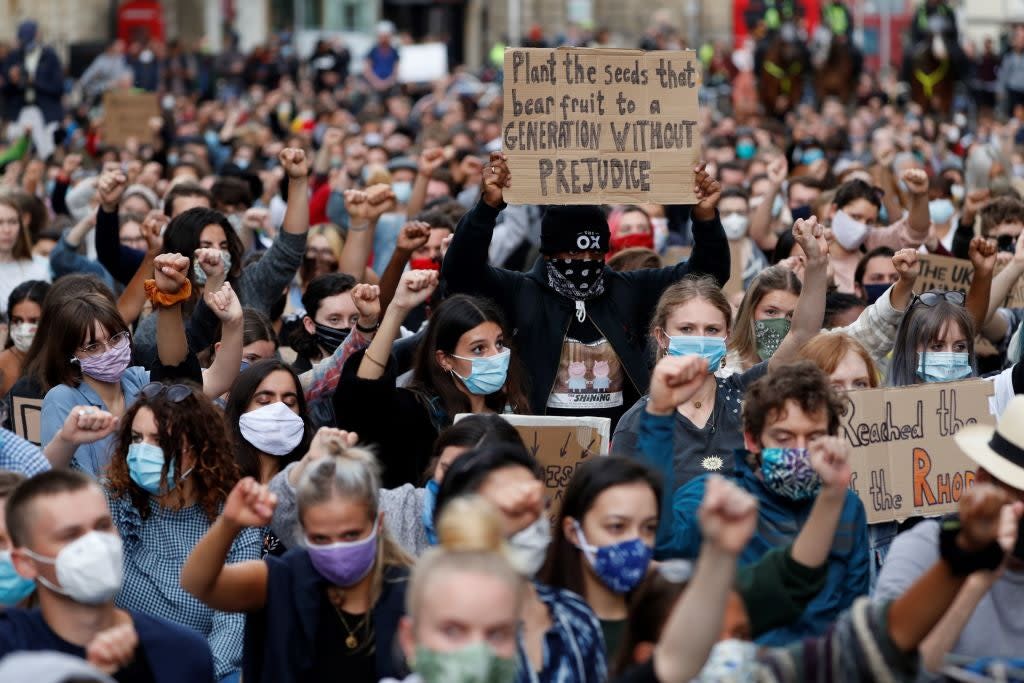Listening to things you don’t want to hear is the only way to demystify racism

Martin Luther King once said that “a riot is the language of the unheard”.
Growing up, I realised that black people were less likely to speak up when offended because we were more likely to be disciplined in a way that would be detrimental to our livelihoods. I remember my father’s advice when I got my first car, in anticipation of being stopped by the police, “no matter what insults are thrown your way, just clench your fist behind your back, quieten your voice and look away."
As expected, I did get stopped by the police and I did exactly as I was told. I engaged my superpower of invisibility. I accepted the injustice and I survived another day. This was common in stop-and-search 80s London and we used to say things like “it is what it is,” or “it’s just the way things are,” but that didn’t change the fact that it’s a wearisome thing, trying to be invisible.
But on the 28 May 2020, after watching eight minutes and 46 seconds of footage of the murder of a black man under the knee of a white man, we, the invisible, decided to discard our cloak and instead took to the streets demanding change. We were demanding to be seen.
It’s now been four months and the agenda has dwindled somewhat from the original front-footed force and momentum that George Floyd’s death had brought about. Some strong advocators of change have now even decided to opt out. Instead of blacked-out squares on social media, posts pop up on your story feed declaring “I’m taking a break for my own sanity”.
You see, weariness has set in like a cold winter and some choose to huddle together to keep warm and feel protected from the racist wolves circling. Wolves that for many years have bayed at their doors, taunting, goading, hungry for a negative response that feeds the racist stereotypes. Forcing people to buck out against their nature so they can say “I told you so”.
I can pinpoint moments in my life where I have played into these roles, code switching to fit the pieces of a puzzle in a white person’s head that was assembled before they even met me. And in those moments when I didn’t conform and bucked the norm, I was greeted with that polite conversation ender that cuts like a knife: “I don’t see your colour”. So, I battled, in the end, made a choice – retreated, stayed passive, stayed invisible.
While others faced the racial injustices boldly, unmasked. Others who challenged, despite their internal fear, held their torches high, keeping the racist wolves at bay. They marched, beaten, imprisoned, emasculated, left jobless, and labelled “trouble”. And the greatest of few were even assassinated.
It was with this same courage that people globally took to the streets amidst a pandemic, placing their own lives on the line.
They held up banners, marched great lengths, and howled to the skies, calling for change. Some feared that by being outspoken, they would be cancelled out in a cancel-out culture. John Boyega feared that his voice would be the end of his outstanding career. I stood not too far away as his young voice bellowed out like rolling thunder in Hyde Park.
"I’m tired!" he screamed.
“We all are!” we replied.
The year 2020 isn’t a landscape to be self-conscious, or insecure, or invisible. To rid the world of racism you have to face it head-on. See it. Name it. Stamp it out.
If I gave in to my weariness or opted out, as I have done in the past, I would be complicit to the legacy of systematic racism that we will leave behind. We are all future mothers, fathers, and children of the unlabelled generation. Our stories that we leave them with today will be the history they will learn tomorrow. So it’s time to be visible, time to be an editor of society rather than a victim, bystander or perpetrator.
Because the burden of fighting racism shouldn’t be carried on the shoulders of one race. It’s something that we all have to bear. We should all be the happy pallbearers, carrying that heavy load of racism to its grave. We should welcome the space it leaves. I like to call this space the “Big Room” – a room where we, as a collective, make ourselves accountable. It’s a room where conversations begin, where stories are told, and ideas are born to defeat the racists wolves within now disguised as allies, smiley-faced and shaking hands.
I quote James Baldwin “the relatively conscious whites and the relatively conscious blacks, who must, like lovers, insist on, or create, the consciousness of the others – do not falter in our duty now, we may be able, handful that we are, to end the racial nightmare, and achieve our country, and change the history of the world”.
And though I face the future with genuine progressive optimism, my thoughts hold me back with a guarded intrepid weariness because initiatives have been put in place, implemented and have not yet withstood the test of time.
That’s why I formed ICARE – Conversations About Racial Equality. An inclusive platform for people to converse. ICARE is about finding solutions and re-educating through listening. To keep the conversation going, to keep the torch lit, to pass it on, to stand up, be visible, and be heard.
Ariyon Bakare is an actor and the founder of ICARE and stars in His Dark Materials, which airs on BBC One this November.
Read more
Why I’m seriously worried about Boris Johnson’s attitude to racism
Dawn French recalls racism towards Lenny Henry during marriage
PM has ‘zero plans’ to tackle impacts of racism, warns ousted adviser
JPMorgan puts $30B toward fixing banking's 'systemic racism'


